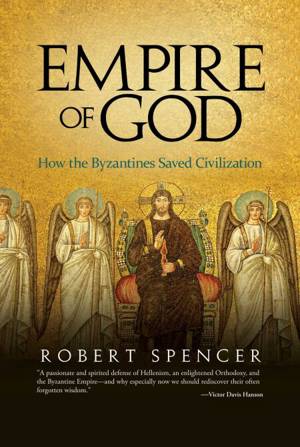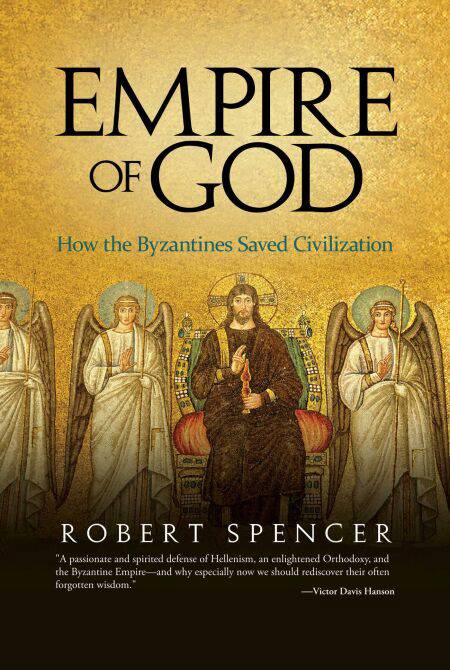
Door een staking bij bpost kan je online bestelling op dit moment iets langer onderweg zijn dan voorzien. Dringend iets nodig? Onze winkels ontvangen jou met open armen!
- Afhalen na 1 uur in een winkel met voorraad
- Gratis thuislevering in België vanaf € 30
- Ruim aanbod met 7 miljoen producten
Door een staking bij bpost kan je online bestelling op dit moment iets langer onderweg zijn dan voorzien. Dringend iets nodig? Onze winkels ontvangen jou met open armen!
- Afhalen na 1 uur in een winkel met voorraad
- Gratis thuislevering in België vanaf € 30
- Ruim aanbod met 7 miljoen producten
Zoeken
€ 17,88
+ 17 punten
Omschrijving
Without the Byzantine Empire, there never would have been Western civilization.
Western civilization is generally regarded as the child of Athens, Jerusalem, and Rome. That is, in the West, our philosophical and political thought is derived from that of the ancient Greeks; our Christian religion comes from the Jewish religion, and both of these came to us via the Roman Empire and the civilization and culture it created.
Western society has other forefathers as well: we would be unwise to give the Byzantine Empire short shrift. The ways in which it has influenced our world for the good, and indeed, created the parameters of our society at its healthiest and strongest, are insufficiently appreciated today. In its confusion, uncertainty, and lack of direction, the West has lost its way. There is a great deal it can, and should, learn from Byzantium.
If the United States were to last as long as the Roman Empire, including its Byzantine period, it would have to continue as an independent country, with political and cultural continuity, until the year 2899. To maintain a unified nation state for over eleven hundred years is a remarkable achievement by any standard, and the Romans accomplished it while facing existential threats and efforts to extinguish their polity during virtually every period of their existence. Now, nearly six hundred years after the demise of the empire, its influence still resonates in a number of fields, albeit almost entirely unnoticed and unappreciated.
There is no arguing with success. It’s time we took notice.
Western civilization is generally regarded as the child of Athens, Jerusalem, and Rome. That is, in the West, our philosophical and political thought is derived from that of the ancient Greeks; our Christian religion comes from the Jewish religion, and both of these came to us via the Roman Empire and the civilization and culture it created.
Western society has other forefathers as well: we would be unwise to give the Byzantine Empire short shrift. The ways in which it has influenced our world for the good, and indeed, created the parameters of our society at its healthiest and strongest, are insufficiently appreciated today. In its confusion, uncertainty, and lack of direction, the West has lost its way. There is a great deal it can, and should, learn from Byzantium.
If the United States were to last as long as the Roman Empire, including its Byzantine period, it would have to continue as an independent country, with political and cultural continuity, until the year 2899. To maintain a unified nation state for over eleven hundred years is a remarkable achievement by any standard, and the Romans accomplished it while facing existential threats and efforts to extinguish their polity during virtually every period of their existence. Now, nearly six hundred years after the demise of the empire, its influence still resonates in a number of fields, albeit almost entirely unnoticed and unappreciated.
There is no arguing with success. It’s time we took notice.
Specificaties
Betrokkenen
- Auteur(s):
- Uitgeverij:
Inhoud
- Aantal bladzijden:
- 400
- Taal:
- Engels
Eigenschappen
- Productcode (EAN):
- 9781637587430
- Verschijningsdatum:
- 20/11/2023
- Uitvoering:
- E-book
- Beveiligd met:
- Adobe DRM
- Formaat:
- ePub

Alleen bij Standaard Boekhandel
+ 17 punten op je klantenkaart van Standaard Boekhandel
Beoordelingen
We publiceren alleen reviews die voldoen aan de voorwaarden voor reviews. Bekijk onze voorwaarden voor reviews.











